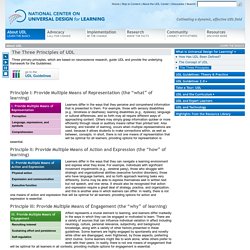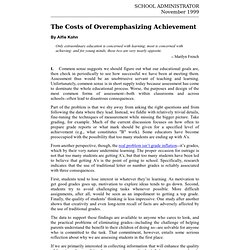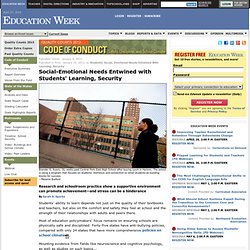

151 Leading Sites for Elementary Educators » Elementary Education Degree. Today’s elementary school kids grew up in the digital age, and they love computer-based activities and learn from them easily.

Learning and sharing online isn’t just for students though. There are hundreds of fantastic sites online to help elementary educators do their jobs as well. From educational videos to interactive games and even e-book publishers, classroom management advice, and teachable moments from teachers who blog, a driven elementary educator can find just about anything he or she needs among these 151 leading sites. The sites here aren’t listed in ranking order, as they all have different strengths and will meet different readers’ needs. Why are so many of our teachers and schools so successful? John Hattie at TEDxNorrkoping. UDL In the Classroom. UDL: The Three Principles. Three primary principles, which are based on neuroscience research, guide UDL and provide the underlying framework for the Guidelines: Principle I: Provide Multiple Means of Representation (the “what” of learning) Learners differ in the ways that they perceive and comprehend information that is presented to them.

For example, those with sensory disabilities (e.g., blindness or deafness); learning disabilities (e.g., dyslexia); language or cultural differences, and so forth may all require different ways of approaching content. UDL Implementation. Universal Design for Learning: Creating a Learning Environment that Challenges and Engages All Students. Universal-Design-FF.pdf. Unit_Plan_Template_including_UDL. Learning Wheel. Udltechtoolkit - home.
K-12 Tech Tools © - home. Unit_Plan_Template_including_UDL. UDL_UDT_presentation (3) Universal Design for Learning Guides, Part 1: Principles of Universal Design. Learning Wheel. Dan Buettner: How to live to be 100+ The Costs of Overemphasizing Achievement. SCHOOL ADMINISTRATOR November 1999 The Costs of Overemphasizing Achievement By Alfie Kohn Only extraordinary education is concerned with learning; most is concerned with achieving: and for young minds, these two are very nearly opposite. -- Marilyn French I.

Part of the problem is that we shy away from asking the right questions and from following the data where they lead. From another perspective, though, the real problem isn’t grade inflation--it’s grades, which by their very nature undermine learning. First, students tend to lose interest in whatever they’re learning.
The data to support these findings are available to anyone who cares to look, and the practical problems of eliminating grades--including the challenge of helping parents understand the benefit to their children of doing so--are solvable for anyone who is committed to the task. All of these features represent the very opposite of meaningful assessment. In fact, researchers could tell you this, too. Why? II. 1. 2. 3. 4. 5. Video Glossary. Autism Autistic Siblings. Social-Emotional Needs Entwined with Students' Learning, Security.
UserID: iCustID: IsLogged: false IsSiteLicense: false UserType: anonymous DisplayName: TrialsLeft: 0 Trials: Tier Preview Log: Exception pages ( /ew/articles/2013/01/10/16environment.h32.html ) = NO Internal request ( 192.99.46.37 ) = NO Open House ( 2014-04-27 21:34:33 ) = NO Site Licence : ( 192.99.46.37 ) = NO ACL Free A vs U ( 2100 vs 0 ) = NO.

Why Suicide Has Become an Epidemic. WHEN THOMAS Joiner was 25 years old, his father—whose name was also Thomas Joiner and who could do anything—disappeared from the family’s home.

At the time, Joiner was a graduate student at the University of Texas, studying clinical psychology. His focus was depression, and it was obvious to him that his father was depressed. Six weeks earlier, on a family trip to the Georgia coast, the gregarious 56-year-old—the kind of guy who was forever talking and laughing and bending people his way—was sullen and withdrawn, spending days in bed, not sick or hungover, not really sleeping. International: The lottery of life.
Warren Buffett, probably the world’s most successful investor, has said that anything good that happened to him could be traced back to the fact that he was born in the right country, the United States, at the right time (1930).

A quarter of a century ago, when The World in 1988 light-heartedly ranked 50 countries according to where would be the best place to be born in 1988, America indeed came top. But which country will be the best for a baby born in 2013? To answer this, the Economist Intelligence Unit (EIU), a sister company of The Economist, has this time turned deadly serious. What Is Consciousness? Growing up bilingual. Social Sciences News - Psychology, Sociology.